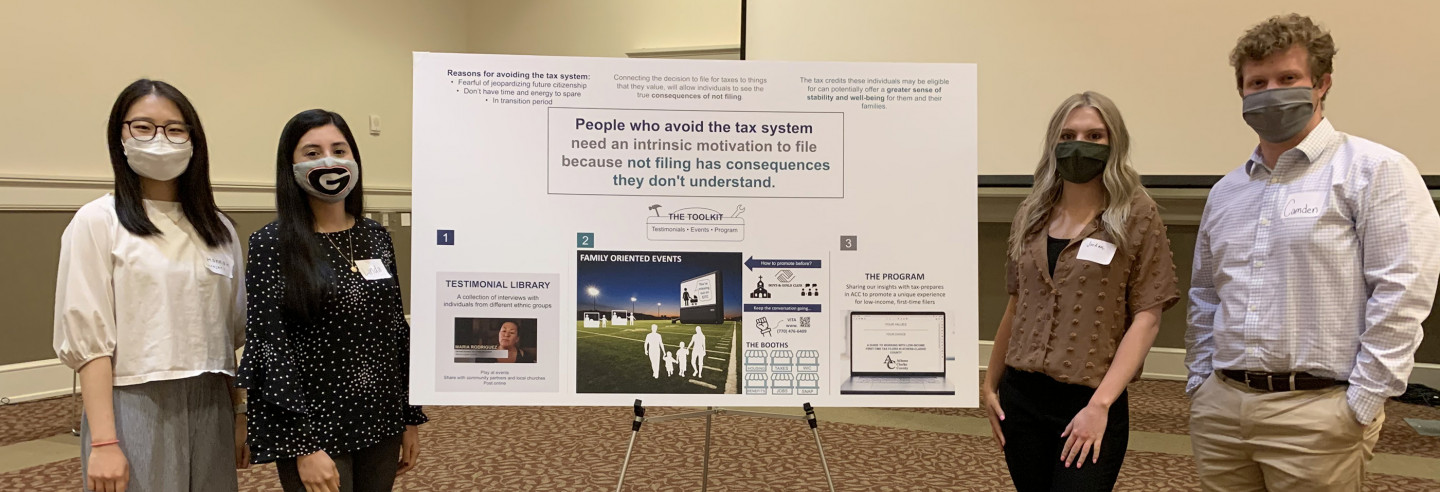Design sprint winners seek solutions for Athens families

Four University of Georgia students claimed the $2,500 top prize for a project designed to improve financial wellness of low to moderate income families in Athens-Clarke County.
Faculty and staff members in the UGA College of Family and Consumer Sciences created the “design sprint” competition to raise awareness about the Earned Income Tax Credit (EITC), a refundable tax credit that is heavily underclaimed in Georgia.
The credit can be worth up to $6,660 for eligible families, and it’s estimated that between $5-$15 million goes unclaimed in Athens-Clarke County alone every year.
A team of UGA faculty members was awarded a three-year, $1.3 million grant from the U.S. Department of Health and Human Services last year to promote EITC outreach education efforts and decrease risk factors for adverse childhood experiences.
“We want people to know about this extra money they could have in their pocket,” said project manager Faith Rasmussen. “But it’s not just about getting extra money from the EITC. It’s also important for families to know how to spend and save this money in a way that will lead to a better financial future.”
Faculty member Dee Warmath proposed the idea of a student design sprint, whereby a team designs a novel solution to complex problems. She worked with Kaylee Ranck, a FACS Ph.D. candidate, to implement the design sprint.
“A sprint is a terrific way opportunity to practice your design thinking skills,” she said. “Ultimately the team communicates the need they discovered and their idea to address it through a compelling story.”
Students from across the university had about a month to complete the project. The winning team of Jordan Bell, Camden Cusumano, Heejae Lee and Linda Olvera designed a project that addressed the question of why people avoid the tax system.
Bell said the team began by combing through interviews with community partners who have close relationships with families who avoid the tax system.
“The interviews led us to realize that people in Athens-Clarke County avoid the tax system for several reasons,” said Bell, a Ph.D. student in the FACS department of financial planning, housing and consumer economics. “Some of the reasons are they don’t trust the system, don’t understand the system or don’t have the time and energy to devote to the system due to the constant demand to make ends meet for their family.”
The interviews were the basis for the team’s main concept, that people who avoid the tax system need an intrinsic motivation to file because not filing has consequences they don’t understand.
Bell and teammates then proposed a toolkit that would contain a video catalog of testimonials from peers who have benefited from claiming the EITC, family-oriented outreach events and a guide for tax preparers who work with the families.
“We gave it our best effort to view the situation through the eyes of the people who are experiencing this need,” Bell said. “These households have earned and deserve this credit, and they should have the ability to experience the benefits of claiming it.”
The team of Christopher Rosselot, Jack Giglio, Anna Claire Stietenroth and Savannah Thorne received $1,500 for their second-place finish.
Third place and $750 went to the team of Katherine Camak, Frank Chin, Laurel Mitelman and Lee Tran, while the fourth-place team of Adam Vanderloop, Ryan LaCotti and Billy Barber received $250.
Georgia United Credit Union sponsored the prize money. The panel of judges included FACS faculty members Lance Palmer and Joan Koonce and Anthony Mallon and Mary Caplan from the School of Social Work, along with representatives from three local non-profits: East Athens Development Corporation, Envision Athens and the Boys and Girls Club of Athens.
Four of the seven teams in the competition were students in the UGA Student Industry Fellows Program overseen by Andrew Potter, Director of Experiential Learning at UGA.
“I have consistently witnessed the ability of UGA students to develop amazing ideas from novel perspectives when given the chance,” Warmath said. “All the students in the design sprint did their homework, immersed themselves in the situation and came away with viable ideas that would have meaningful impact.”
For more information on the EITC, visit https://www.fcs.uga.edu/fhce/eitc
In this category: Finance
-
Follow these tips to avoid making credit card mistakes
Faculty member Effie Antonoudi provides insight for students

-
Estate planning workshop aims to bridge knowledge gap for Georgians
Free workshop features attorney presentations to help residents protect assets

-
Expert tips to avoid overspending on clothes
Faculty member Michelle Kruger offers some insight to consumers considering a wardrobe upgrade

-
Hargrove named assistant director of UGA Love and Money Center
Licensed marriage and family therapist will teach graduate-level courses and lead outreach efforts

-
Organize your expenses better with these expert tips
Faculty member John Grable answers some common questions related to budgeting
